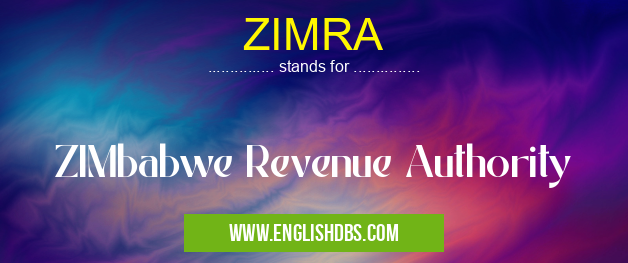What does ZIMRA mean in AUTHORITIES
ZIMRA stands for ZIMbabwe Revenue Authority, a statutory body established by the Revenue Authority Act (Chapter 23:11) of 2001. ZIMRA is responsible for administering and enforcing tax laws in Zimbabwe, including the collection of taxes, duties, and other levies.

ZIMRA meaning in Authorities in Governmental
ZIMRA mostly used in an acronym Authorities in Category Governmental that means ZIMbabwe Revenue Authority
Shorthand: ZIMRA,
Full Form: ZIMbabwe Revenue Authority
For more information of "ZIMbabwe Revenue Authority", see the section below.
ZIMRA's Mandate
- Collect and administer taxes, duties, and other levies on behalf of the Government of Zimbabwe.
- Enforce tax laws and regulations to ensure compliance.
- Provide taxpayer education and support services to facilitate voluntary compliance.
- Combat tax evasion, smuggling, and other tax offenses.
ZIMRA's Functions
- Tax assessment and collection: ZIMRA determines the amount of tax payable by taxpayers based on their income, expenditure, or other criteria.
- Customs and excise administration: ZIMRA controls the movement of goods across Zimbabwe's borders and collects duties and taxes on imported and exported goods.
- Enforcement and investigation: ZIMRA investigates and prosecutes tax offenses to ensure compliance and deter tax evasion.
- Tax policy and legislation: ZIMRA provides input into the development and implementation of tax policies and legislation.
ZIMRA's Impact
ZIMRA plays a crucial role in generating revenue for the Zimbabwean government. The revenue collected funds public services, infrastructure development, and other essential government programs. Additionally, ZIMRA's enforcement efforts help to create a fair and equitable tax system, reducing tax avoidance and evasion.
Essential Questions and Answers on ZIMbabwe Revenue Authority in "GOVERNMENTAL»AUTHORITIES"
What is ZIMRA?
ZIMRA stands for Zimbabwe Revenue Authority. It is the government agency responsible for collecting taxes and administering customs and excise duties in Zimbabwe.
What types of taxes does ZIMRA collect?
ZIMRA collects various taxes, including income tax, value-added tax (VAT), corporate tax, withholding tax, and excise duty.
How can I register for taxes with ZIMRA?
You can register for taxes online through the ZIMRA eServices portal or by visiting your nearest ZIMRA office. You will need to provide personal information, business details (if applicable), and supporting documentation.
What are the deadlines for filing tax returns?
The deadlines for filing tax returns vary depending on the type of tax. For individuals, income tax returns are due on June 30th each year. For companies, corporate tax returns are due on March 31st each year.
What happens if I fail to file my tax returns on time?
Late filing of tax returns may result in penalties and interest charges. ZIMRA encourages taxpayers to file their returns on time to avoid any additional charges.
How can I make tax payments?
Tax payments can be made through various channels, including online banking, mobile banking, RTGS, or by visiting a ZIMRA office.
What are the consequences of tax evasion?
Tax evasion is a serious offense that can result in penalties, fines, and even imprisonment. ZIMRA takes tax evasion cases very seriously and encourages taxpayers to comply with their tax obligations.
How can I get assistance with tax-related queries?
You can contact ZIMRA's Customer Contact Center by phone, email, or through their website. Alternatively, you can visit your nearest ZIMRA office for personalized assistance.
Final Words: ZIMRA is the ZIMbabwe Revenue Authority responsible for administering and enforcing tax laws in Zimbabwe. Its mandate includes collecting taxes, duties, and other levies, enforcing tax regulations, and providing taxpayer services. ZIMRA's operations are vital to the functioning of the Zimbabwean government and the economic well-being of the country.
